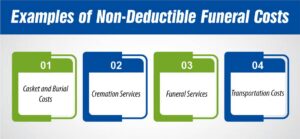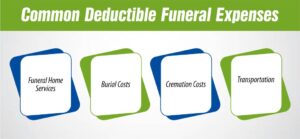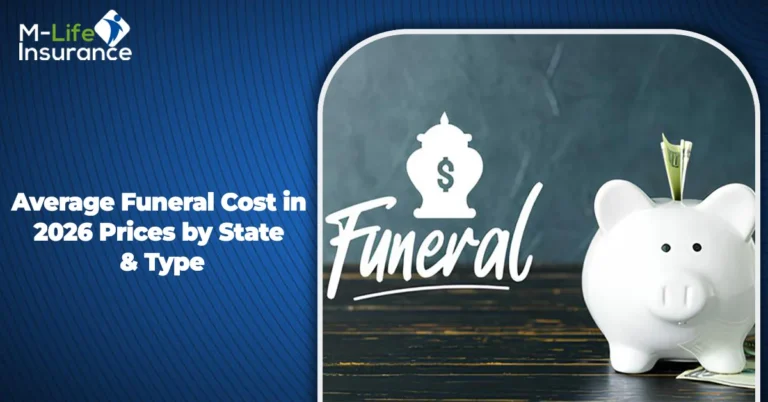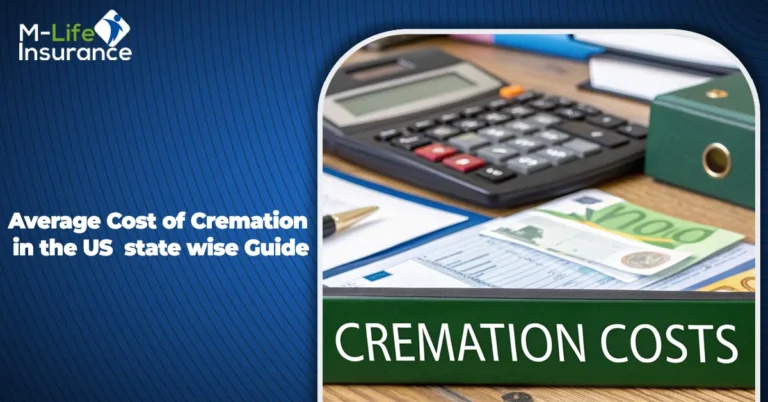Last Updated on: January 18th, 2025
Reviewed by Dylan Whitman
- Licensed Agent
- - @M-LifeInsurance
Families always worry about how to manage to finance a funeral, and more often they need to know if they can offset the amount for tax. Coping with funerals comes with certain expenses, which one may be thinking of reducing their tax burden by claiming them. Now, let’s get down to the specifics, IRS rules, and things you can do to better control these expenses.


Funeral Expenses and Personal Tax Deductions
Under normal circumstances, any expenses incurred in the funeral funeral service are not allowed as tax deductions. This means that if you use your own money to pay for a funeral of a relative, you cannot claim those amounts as deductions when filing personal income tax. Personal expenses are not tax deductible in the sight of the IRS and funeral expenses are part of such expenses.
Examples of Non-Deductible Funeral Costs:
- Casket and Burial Costs: Expenses on the casket, the burial place, and grave stone.
- Cremation Services: Charges like the cremation, and the urn.
- Funeral Services: Expenses incurred for people you pay such as the venue, the officiate, and any party or gathering that takes place after the funeral.
- Transportation Costs: Travelling expenses of hearse or other conveyance used in the funeral exercise.
Exception: Deducting Funeral Expenses from an Estate
In specific circumstances, funeral expenses can be deducted, but this applies only to estates that meet certain criteria.When Can Funeral Costs Be Deducted?
- Estate Tax Filing Requirement:
-
-
- Funeral expenses are allowed as deductions only and only if the estate of the deceased liberates a federal estate tax return. This is mostly true under circumstances where total value of estate surpasses federal exemption level which may vary from one year to another.
-
- Expense Documentation:
-
-
- When applying for funeral expenses, the necessary paperwork includes invoices, receipts and proof of expense The estate Must pay expenses:
- Ideally, funeral expenses should have come from the estate; which means the income generated from the estate paid for the funeral, and not each family member.
-
- Common Deductible Funeral Expenses for Estates:
-
- What selling points and cost structure would most likely attract clients at a funeral home.
- Transit or the carriage of the corpse.
Can funeral costs be deducted from estate taxes?
Even if funeral costs have been paid from the estate, these may be claimed as deductions from estate taxes, but it must meet some pre-Reform Act conditions. It is helpful for executors and the other family members to familiarise themselves with these criteria, in case there is a need to undertake estate related tax issues.Rules as to When Funeral Expenses are Allowed
It is therefore important to note, that what and how much may be deducted regarding funerals actually depends on the size of the estate, and how the funeral expenses have been looked into. Below are the key requirements:1. The estate must be subject to the federal estate taxes.
Any funeral expenses must be claimed on Form 706, only if the decedent’s estate is in a position to be filing a federal estate tax return. Normally it applies when one is dealing with a huge estate that goes beyond the federal estate tax exemption. Recently it has been somewhere near $12-$13 million, yet the figure is changeable due to shifts in tax regulations.2. This means that expenses are strictly required to be paid within the estate by the real estate as well.
Funeral expenses are generally not tax-deductible for individuals. However, if these costs are paid directly from the deceased’s estate, they may be deductible against the estate’s gross value, potentially reducing estate taxes. It’s important to note that only the estate can claim these deductions; expenses paid by heirs, family members, or other individuals are not eligible. Additionally, the IRS requires that funeral expenses be “reasonable and necessary” to qualify for the deduction.3. Proper Documentation is Required
- The executor of the estate must provide accurate records, such as:
- Bills received from the funeral home.
- Original receipts for costs of transportation of the deceased, burial or cremation.
- payment received from the estate’s accounts
How Funeral Cost Deductions is Carried Out
When claimed, as funeral expenses, such expenditures can serve to decrease the size of the estate for tax purposes and thus decrease the overall taxable value of the estate.Example Scenario:
- The total value of the estate is $15 million more than the federal limit of $13 million in exemption for transfer.
- Burial, transportation and funeral home costs amount to $50, 000.
- The deductions subsequent to estate duty can be computed as follows: Subtracting 50,000 from the taxable portion of 2,000,000 the estate value comes to 1,950,000.
Filing the Deduction
1. In the Estate Tax Return (Form 706)
The deduction has to be taken on the federal estate tax return appropriately known as the IRS Form 706 and this normally will be done by the executors.2. Not on Personal Tax Returns
The reader must understand that this deduction only applies to estate tax. In particular, all the expenses incurred during the funeral cannot be claimed on an individual’s personal income tax return.Funeral Expenses Tax Deduction: Eligibility and Requirements
In terms of the estates tax return most people will want to know how they can claim funeral expenses as a deduction, this is where the following criteria must be met. It makes certain that only rightful and unavoidable expenses are being incurred. Below are the main conditions to be aware of:Paid by the Estate
Burial expense must be paid by money from the estate for it to be considered as tax allowable expense incurred for the deceased. The expenses have been paid by any family member, friends or other sources outside the estate are not deductible. It means that to meet all funeral related expenses, it is necessary to manage the estate funds appropriately in accordance with this requirement.Documented Expenses
To claim these expenses at all, the IRS requires the funeral expenses to be documented in detail. This involves being able to keep proper records of receipts, invoices and proof of payment. Documentation is very important since in case of an audit or a review, failure to avail sufficient records will lead to the deduction not being allowed.Essential and Other Related Expenditures
There are serious limitations surrounding funeral expenses which includes the fact that only reasonable and necessary claims of funeral expenses are allowed deductions. These costs typically include:- Funeral home services: This ranges from embalming, cremation or any other related service.
- Burial or cremation costs: Burial or cremation expenses are considered qualified expenses.
- Cemetery plot fees: Any expenditure incurred for the purchase of burial or cremation area is also deductible.
- Transportation of the body: Funeral or burial related transport costs including moving the body of the deceased are eligible.
- Memorial services: Expenses relating to the management of a memorial or funeral service are in the category.
- Caskets, urns, and headstones: The items used for burial or rather cremation are deemed as necessary.
Step 1: Itemize the Costs
The first step therefore calls for a clear description of all expenditures, costs associated with funerals. To report each expense, choose the section on Form 706 that is reserved for deductions. For clarity and compliance:- There is always a list of believable labels which are usually selected by most people such as ‘services of embalming’, ‘purchase of a casket’, ‘fees of a funeral home’ among others.
- It should not be indirect structures such as ‘other expenses’ type which may cause question marks or even lead to disbarment.
- Cover all reasonably and reasonably necessary expenses, which are incidental to death, including transportation of the deceased, burial plot, and cost of a funeral service.
Step 2: Attach Documentation
The IRS demands proof for all the expenses that one incurs towards funerals. Attach the following to your tax return:- Receipts: These must also display the total amount charged for a service of an item like a casket or a headstone.
- Invoices: Statement of account from service providers as well as charges that may be specified for embalming, cremation or burial.
- Payment Records: Statements of canceled checks or money orders that were paid directly out of the estate funds by checks or credit cards.
Step 3: Follow IRS Guidelines
It is crucial when claiming funeral expense deductions to meet the Standard of the Internal Revenue service. Key considerations include:- Eligible Expenses: Only those costs which are reasonable and necessary are allowed are allowed. For instance, fees charged by funeral homes for services such as those of the embalmer, conveyance and cemetery fees are acceptable but other expensive items such as expensive caskets and floral adornments usually regarded as outrageous funerary expenses may not be allowed.
- Source of Funds: It has to be reasonable and actual expenses have to have been paid from the estate. Such expenses incurred through family or friends cannot be claimed from the emoyer prepaid medical expense tax credit.
- Compliance with Tax Laws: Consult the most recent IRS rules to check all the costs for compliance with current requirements.
Additional Tips for Filing
- Double-check totals: Check Form 706 to see that the attached receipts and invoices correspond to the amounts given on the return. Otherwise, it could lead to delays and new questions from the counterparties who work with KMP using its services.
- Keep Copies of All Documents: Keep records of the receipts you have provided to the IRS, as well as invoices for payments, and records of actual payments made.
- Seek Professional Assistance: Estate tax returns filing can be a little detailed. Employing the services of a specialist in tax matters is efficient as well as reduces the risk of errors in filing and non-compliance.
Tax Implications of Paying Funeral Expenses From the Estate
Ensuring funeral expenses is paid from the estate as a primary responsibility can have serious tax implication especially to anyone managing the assets of a deceased individual. It is also important here to mention, that the knowledge of these repercussions allows the executors and beneficiaries to save money as well as observe all ensuing legal requirements and restrictions concerning taxes. Finally, we refine funeral costs as an object of discussion with reference to its relation to the estate taxes.1. Decreasing the Number of Properties & Bringing down the Assessee’s Taxable Value
If funeral expenses are paid directly from the estate it can lower the taxable estate amount. This serves well for large entailed estates that may fall to federal or state estate taxes. When the allowable funeral expenses including burial and transportation cost and any other funeral service has been deducted from the estate, the amount of taxes that may be payable will be reduced. Where estates are close to the federal estate tax exemption, this deduction can lead to great savings.2. No Personal Tax Deductions
As it has been established, those who pay the funeral costs within their own pockets are prohibited from taking deductions on their personal incomes tax returns. Tax laws now confine this deduction strictly to only those costs, that are expensed directly from the estate. The payments made to third parties by the executors should again be well documented to account for the payments so as to allow the executors to clearly meet the requirements for the deduction allowed under the ITA.3. Compliance with IRS Rules
The rules governing funeral expenses deduction by the IRS must be strictly followed in estates. A major argument has it that all expenses claimed as deductions must be automatic and inevitable. Also, proper record-keeping, and accounting records in form of receipts or invoice has to be well prepared to support the deduction. Noncompliance with these regulations results in penalties or denial of the deduction, which making the settlement of the estate a complicated task.
Common Deductible Funeral Expenses
When it comes to dealing with the funeral expenses it is necessary to understand which of the expenses may be considered as deductible for the estate taxes. But not all expenses are considered, the kind of charges that are normally accepted are normally among the funeral expenses when paid directly from estate. listed below is expenses that has the potential of lowering the value of estate that is subjected to taxation.1. Funeral Home Services
Such are the services offered by a funeral home which include; Putting the dead on makeup, dressing the dead, arranging the dead body for any form of burial ceremony or displaying it at the funeral home or during ceremonies. Other costs that are likely to be deductible include charges for staff assistance involvement and overall co-ordination, and the administrative costs during the period.2. Burial Costs
However, expenses that might be incurred in burial are generally allowed as a deduction. This may encompass the procurement of the burial lot, casket, tomb, or other funeral articles without which burial cannot occur. Such costs which have to be incurred have to be incidental and necessary for the burial process.3. Cremation Costs
For anyone opting for cremation, the expenditures paying for cremations and buying ashes containers known as urns are tax deductible. Such expenses are allowed if they are necessary and were made from the estate.4. Transportation
Travel expenses related to moving the deceased’s body to the funeral home, burial ground, or crematory, may be deductible. This also applies to hearse services or any other computation may be needed in the funeral provisions. In most cases, any funerals expenses that are not allowable against income tax are referred to as non-deductible funeral expenses. Some of the funeral expenses cannot be claimed as deductions when it comes to estate taxes. Some of these costs though traditional and significant in the cultural burial process are accorded a personal nature and hence do not qualify.Non-Deductible Funeral Expenses in Estate Tax Returns
1. Obituaries
Despite it being a tangible way of letting the friends and families of a loved one know that he or she has died, the cost of publishing obituaries is normally not tax-deductible. Such costs are considered individual and differ from the actual payment of the estate.2. Flowers
Bouquets, which are used in funerals as a sign of respect and are also esteemed personalized additional activities, are also included in personal expenses. : Although they are beautiful and sentimental to some extent they are not regarded as necessary and reasonable expenses in respect of estates in the computation of estate tax.3. Clergy Fees
In cases where only officiants or clergy or spiritual leaders are used to conducting the funeral ceremony they are normally considered personal expenses. Such costs although relevant to several ceremonies related to the process of death, do not fall squarely under the administration or settlement of estates.4. Travel for Attendees
Any amount paid for meals, transports, accommodation for families or friends who attend funeral are not allowed. These costs are seen as discretionary and outside the purview of managing an estate’s assets, which includes paying off debts.Tax Rules of Funeral Expense Deductions As Per the IRS
There is a clear way Woden prepared by the IRS which would make funeral expenses allowable deductions from an estate. Both executors and beneficiaries need to adhere to these rules in order to not run afoul of the law and to get the most from allowable deductions. The following are the fundamental IRS standards for funeral expense claims:1. Filing Requirement
To deduct funeral expenses from the estate, the estate needs to file federal estate tax return as on form 706. This form is normally filled where the gross amount of the estate exceeds the federal estate tax exclusion amount. When filing the Form 706, the executor can detail expenses on funeral, which is a deductible expense that is direct towards burial, cremation, and services.2. Documentation
Any and every funereal expense suggested to be deductible must be evidenced by receipt, invoice, or proof of payment. The executors should also keep records of all transactions frequently to avoid cases where costs are hidden all over the place. This documentation is useful if at some time in the future the IRS wants proof of what was deducted during the auditing.3. Reasonableness
For an expense to be deductible on the basis of burial or funeral expense, the IRS only permits the deduction of amounts that it regards as reasonable and necessary. Costs may be regarded as extravagant or excessive if incurred. For instance, a simple funeral ceremony and burial are allowable, but an ostentatious casket, a lavish floral arrangement or an expensive memorial funeral service that might be deemed as extravagant in relation to the estate may well be questioned and perhaps refused.4. Paid by Estate
All the funds for funeral expenses paid by the estate directly can be considered for deduction. Any expenditure on funeral-related expenses borne by a family member or any other person from his pocket is not allowable, even though, the amount may be refunded by the estate at a later date. Therefore, executors must be certain that all the legitimate funeral expenses are incurred and paid out of the estate’s money for qualification.Conclusion about Are Funeral Expenses Tax Deductible?
Therefore, it is comprised to conclude that funeral expenses are but not tax deductible. The IRS rules do not permit deductions for funeral expense, burial or cremation or related services for individuals or estates. However, there are some situations where the expenses, which have connection with the deceased estate, for instance, medical bills or debts, can be deducted. It is always advisable to consult a tax advisor about specific details of tax for one’s particular circumstances considering that tax laws change from time to time considering ofones’ circumstances.FAQs of Are Funeral Expenses Tax Deductible?
1- Are Funeral Expenses Tax-Deductible?
Funeral expenses are not deductible on personal tax returns. However, they can be deducted from an estate’s taxes under certain conditions.2- Can Funeral Costs Be Deducted From Estate Taxes?
Yes, if the estate is subject to federal estate taxes and the expenses meet the IRS rules on deducting funeral expenses.3- What Types of Funeral Expenses Can Be Deducted?
Expenses such as burial, cremation, and memorial services can qualify, as long as they are reasonable and paid by the estate.4- How Do I Report Funeral Expenses on My Tax Return?
Funeral expenses must be reported on the estate’s tax return. Include all necessary documentation and follow IRS guidelines.5- Do I Need to Itemize Deductions to Claim Funeral Expenses?
Yes, itemizing is required when filing the estate tax return to claim these deductions. Resources
Joyce Espinoza, Expert Life Insurance Agent
Joyce Espinoza is a trusted life insurance agent at mLifeInsurance.com. She’s been in the insurance industry for over ten years, helping people, especially those with special health conditions to find the right coverage. At MLife Insurance, Joyce writes easy-to-understand articles that help readers make smart choices about life insurance. Previously, she worked directly with clients at Mlife Insurance, advising nearly 3,000 of them on life insurance options.





